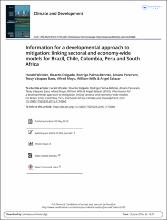Por favor, use este identificador para citar o enlazar este ítem:
https://hdl.handle.net/20.500.12921/494| Título : | Information for a developmental approach to mitigation: linking sectoral and economy-wide models for Brazil, Chile, Colombia, Peru and South Africa |
| Autor : | Winkler, Harald Delgado, Ricardo Palma Behnke, Rodrigo Pereiram, Amaro Vásquez Baos, Tessy Moyo, Alfred Wills, William Salazar Vega, Ángel |
| Palabras clave : | Mitigación del cambio climático Reducción de emisiones Programa ONU-REDD Amazonía África |
| Fecha de publicación : | jun-2016 |
| Editorial : | Taylor and Francis |
| Citación : | Journal Climate and Development, 9 (6): 1-12 |
| Resumen : | Improved tools are required to deliver good information for decision-making on the potential socio-economic benefits of a transition to a low-carbon society. This article reports on modelling approaches to answer policy-relevant questions carried out research teams in Brazil, Chile, Colombia, Peru and South Africa. The teams link detailed models of sectors with economy-wide models and report methodological findings. Combining bottom-up and top-down models holds the promise of addressing short and long-term time-frames technological change, economy-wide interactions, direct costs, emissions reductions, and broader socio-economic implications of mitigation. While making different choices of models, common challenges were identified around: communication between the two models; treatment of time; convergence criteria; trade-offs between model accuracy and requirements of stakeholder processes; and level of integration of sectors within the economy-wide model. The teams each examined a diverse range of mitigation actions. By assuming the same range of carbon prices (US$10, US$20 and US$50 per ton of CO2-eq) results can be compared, while understanding that variation may also be due to assumed differences in carbon pricing mechanisms, recycling of revenue and models chosen. The studies for Brazil and Chile found relatively higher emission reductions at this medium carbon price than those for South Africa and Colombia. Our analysis of the socio-economic implications suggests that emissions reductions with a medium carbon tax would be accompanied by Gross Domestic Product (GDP) losses ranging from 0.5% of GDP to 3%. Three studies further examined implications for employment and wages and found negative effects, which could be softened only to some extent by recycling of revenue. |
| URI : | https://hdl.handle.net/20.500.12921/494 |
| ISSN : | 1756-5537 |
| Aparece en las colecciones: | Artículos en revistas indexadas |
Ficheros en este ítem:
| Fichero | Descripción | Tamaño | Formato | |
|---|---|---|---|---|
| winkler_articulo_2016.pdf Until 2045-12-01 | Texto Completo | 692,91 kB | Adobe PDF |  Visualizar/Abrir Request a copy |
Compartir :
Los ítems de DSpace están protegidos por copyright, con todos los derechos reservados, a menos que se indique lo contrario.



